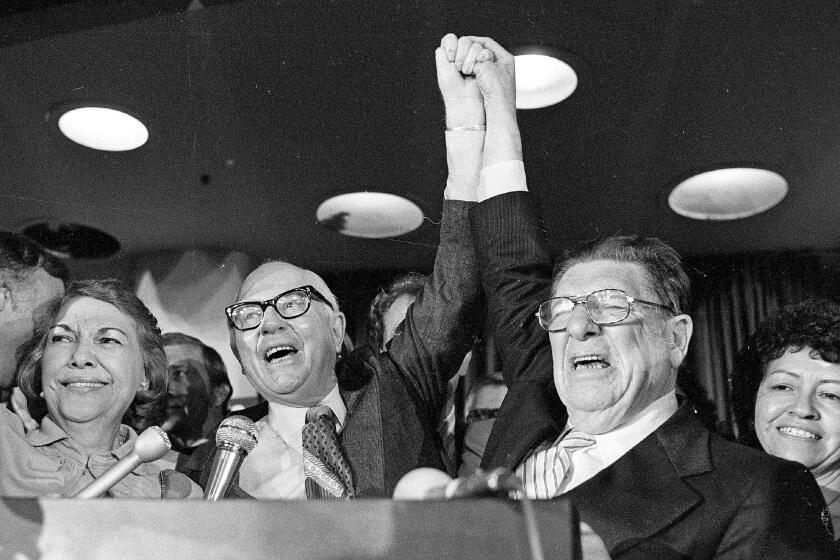Endorsement: Dianne Feinstein’s seniority and experience are too valuable to give up. California should reelect her

- Share via
Before the June primary, the Los Angeles Times editorial board backed Dianne Feinstein for reelection, saying her seniority, gravitas and 26 years of experience in the U.S. Senate were too valuable to give up.
Four months later, amid the unending turmoil in Washington, the ugliness of the Brett Kavanaugh Supreme Court nomination hearings and the growing partisan gulf around the country, it’s only become more clear to us that Feinstein is the right person for an increasingly difficult job.
California voters should reelect her.
Feinstein, who became a senator in 1992, is running for a fifth six-year term. For the first time in many years, she is facing a serious challenge, from a fellow Democrat, state Sen. Kevin de Leon. De Leon is a self-described leader of the anti-Trump resistance; during the primary, he declared that, if elected to the Senate, he wouldn’t work with President Trump.
Feinstein has a long, distinguished track record of service, and she is the best choice to represent California.
Feinstein and De Leon hold similar positions on many key issues facing California. Both are outspoken advocates of gun control, environmental protection and immigration reform. Their differences are largely in tone and style. Feinstein is a pragmatist grounded in the reality of what is and isn’t possible. She knows how to move bills, cut deals, influence policy and secure funding in a deeply partisan environment. De Leon tends to shoot for the moon with ambitious policy proposals. That’s been a lot easier to do in the Democrat-controlled Legislature than it would be in the U.S. Senate.
De Leon has argued that Feinstein is too much of a centrist to represent liberal California and that she is too accommodating to Trump. He’s complained that she is too conciliatory to GOP colleagues and he criticized her for abiding by the “country club rules” of the Senate. But even if he sees it that way, Republicans don’t.
As the highest-ranking Democrat on the Judiciary Committee, Feinstein became a target for President Trump and other Republicans during Kavanaugh’s confirmation process, especially for her handling of the letter from Dr. Christine Blasey Ford alleging that Kavanaugh sexually assaulted her while they were high school students.
For that, Feinstein was lambasted from the right by Republican senators who accused her of “weaponizing” Ford’s letter by releasing it at the very last minute to cripple Kavanaugh’s nomination. (Trump, who calls her “Sneaky Dianne Feinstein,” has accused her of leaking the letter, which she denies.) She was also criticized from the left by some Democrats who felt she should have released the letter sooner. De Leon called it a “failure of leadership.”
The reality is that Feinstein was in a highly difficult position. Ford insisted on remaining anonymous, and an allegation without a name attached couldn’t have been investigated in a meaningful way. Staffers for Feinstein say they checked back with Ford several times to see if she would change her mind, but they were reluctant to pressure her, knowing her life would be turned upside down — as it subsequently has been — once her name became public.
It’s easy to dismiss Feinstein’s caution as a sign of weakness, or to misconstrue her reticence as cold political calculus. That’s the environment of Washington, D.C., today. It’s winner-take-all, partisan gamesmanship. Feinstein is a senator from an earlier, more civil and more productive era of governance.
Enter the Fray: First takes on the news of the minute from L.A. Times Opinion »
And look what she’s accomplished with that approach. To name just a few things, she authored the ban on assault weapons in 1994, pushed the Desert Protection Act through Congress and, thanks to her high-ranking position on the Appropriations Committee, steered billions of federal dollars to California projects such as subway construction and wildfire restoration. She led the fight to expose the CIA’s use of torture.
De Leon has been a good state legislator, fighting to improve conditions for low- and moderate-income Californians. But as a freshman in the U.S. Senate, most likely in the minority, unwilling by his own admission to compromise, what would he be able to achieve? Feinstein’s experience and influence are much more valuable.
Some seem to think that Feinstein’s willingness to negotiate across the aisle is reason enough to vote her out. But a better approach would be to reelect her and more candidates like her: people who know when to stand firm on matters of principle and when to negotiate to get things done. The country needs more lawmakers who understand that their mission is not to score points for their political party, but to vigorously defend our institutions, safeguard our freedom and serve the people by passing sensible, effective legislation.
Feinstein has a long, distinguished track record of service, and she is the best choice to represent California.
Follow the Opinion section on Twitter @latimesopinion and Facebook.
More to Read
A cure for the common opinion
Get thought-provoking perspectives with our weekly newsletter.
You may occasionally receive promotional content from the Los Angeles Times.










